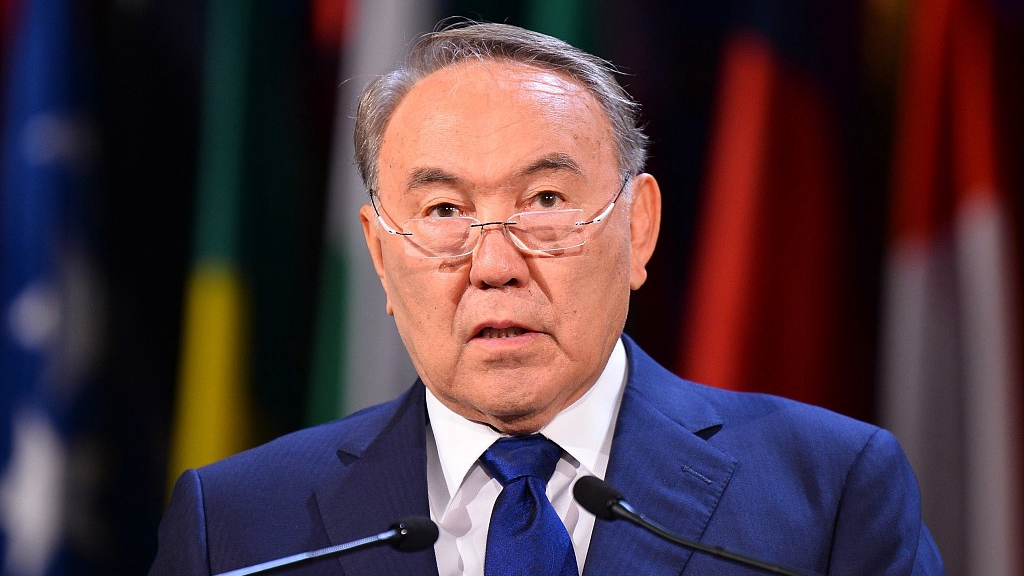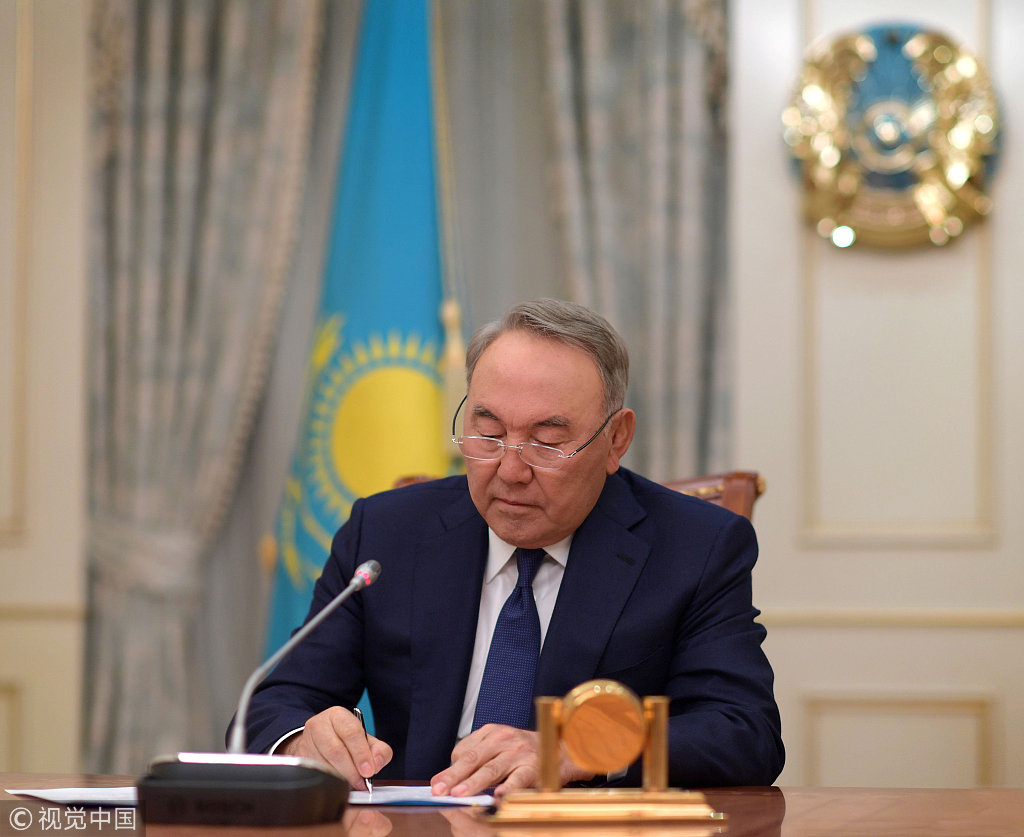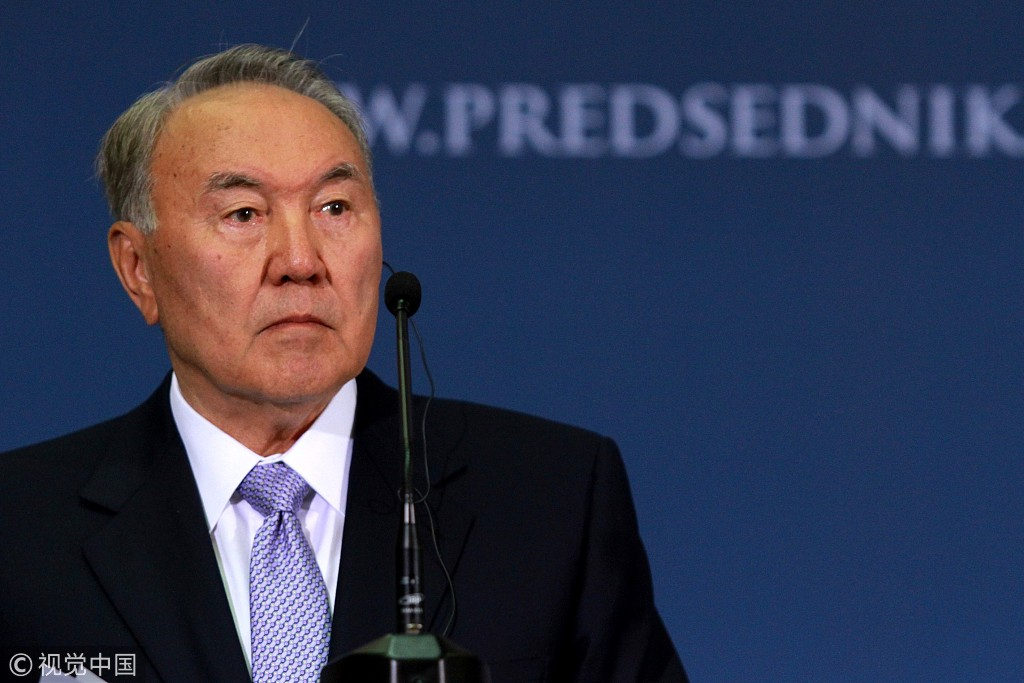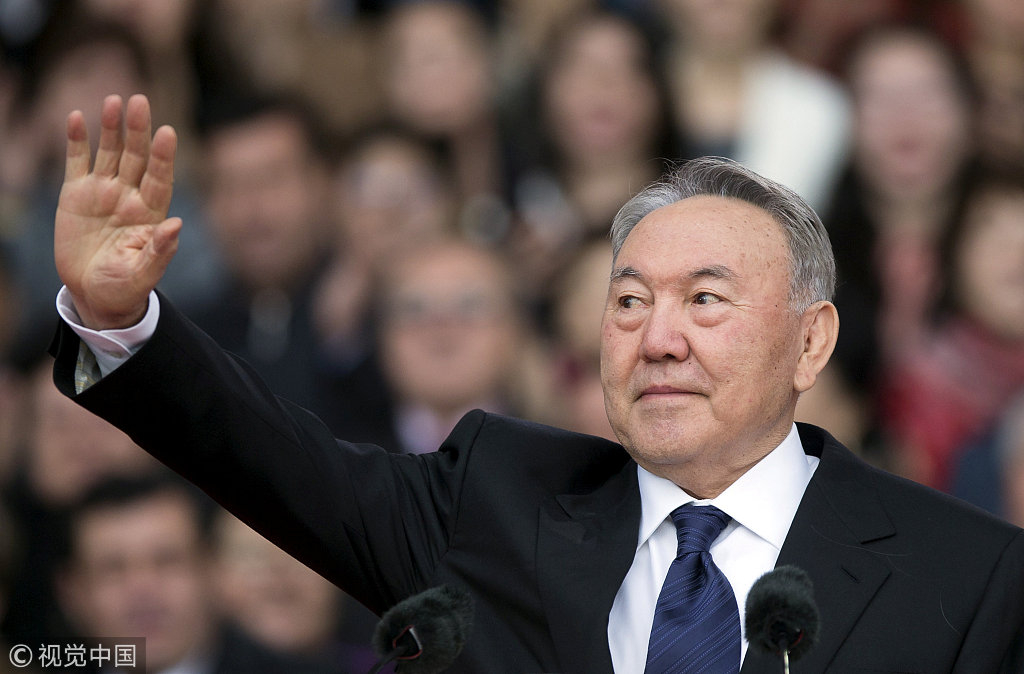
Opinion
13:20, 20-Mar-2019
A planned political transition in Kazakhstan
Updated
22:00, 20-Mar-2019
Cui Zheng & Yang Yueming

Editor's note: Cui Zheng is an associate professor at the Research Center for the Economy and Politics of Transitional Countries at Liaoning University, and Yang Yueming is an assistant researcher at the Research Center for the Economy and Politics of Transitional Countries at Liaoning University in China. The article reflects the authors' views, and not necessarily those of CGTN.
On the evening of March 19 local time, Nursultan Nazarbayev, who has been Kazakhstan's top leader for nearly 30 years, announced his resignation from the presidency in a televised speech.
According to the Constitution, the president's duties will be performed by the Chairman of the Senate Kassym-Jomart Tokayev. Before the new presidential election is held, the Senate chairman will act as president during the transitional period until the new president is elected.
A lot of international media have used words like “shock” and “sudden” to describe the incident. People are speculating on the reasons behind this, comparing Nazarbayev's power transfer to a replay of Putin's succession at the end of last century or a replica of Lee Kuan Yew's succession plan in Singapore.
The wilder speculation even has it that historic changes are taking place in Kazakhstan. As a matter of fact, Nazarbayev had already made full preparations before announcing his resignation. He can still exert “decisive” influence in Kazakhstan and ensure the stable political and economic development of Kazakhstan and the continuation of its foreign policy.

Former Kazakh President Nursultan Nazarbayev writes during a televised address to announce his resignation in Astana, Kazakhstan, March 19, 2019. /VCG Photo
Former Kazakh President Nursultan Nazarbayev writes during a televised address to announce his resignation in Astana, Kazakhstan, March 19, 2019. /VCG Photo
The planning
In 2017, under the leadership of Nazarbayev, Kazakhstan began to implement constitutional reforms aimed at weakening the power of the president. The future presidents will no longer enjoy all the powers possessed by the country's first and only president so far.
In July 2018, the Law “On the Security Council of the Republic of Kazakhstan” came into effect, granting the first president Nazarbayev the position of life-long chairman of the Security Council. It ensures that even if he no longer holds the post of president, he can still take the lead in major issues concerning national security.
In addition, his multiple identities as “national leader”, “lifetime councilor” and Chairman of the Party Nursultan can enable Nazarbayev to maintain his influence on Kazakhstan's future political process.
In August and September 2018, Nazarbayev made adjustments to key positions in the country, replacing key positions such as President Aide, Secretary of the Security Council, Director of the Foreign Intelligence Agency and Minister of Defense. In February 2019, the government was dissolved and a new prime minister was appointed.
When there is no obvious abnormality in his physical condition, rearrangement and reshuffle of “inner circle” and various groups around him can ensure full understanding and support of major political arrangements in the future.

Former President of Kazakhstan Nursultan Nazarbayev holding a joint press conference with Serbian President Tomislav Nikolic (not seen) after their meeting in Belgrade, Serbia, August 24, 2016. /VCG Photo
Former President of Kazakhstan Nursultan Nazarbayev holding a joint press conference with Serbian President Tomislav Nikolic (not seen) after their meeting in Belgrade, Serbia, August 24, 2016. /VCG Photo
In February 2019, Nazarbayev consulted the Constitutional Council on whether there are any detailed provisions in Article 3, Clause 42 of the Constitution regarding the early termination of the president's power.
This action clarifies the constitutional provisions for early resignation before the end of the president's term of office. All of the above are seen by the outside world as signs to prepare for the political transition.
The legacy
Today Kazakhstan, under Nazarbayev's leadership, has completed the important task of independent nation-building, overcoming the difficulties of the 1990s, with its total economy increasing by 15 times, residents' income up by 9 times and poverty rate falling by nearly 10 times.
Kazakhstan, which has rich oil resources and the world's ninth largest land area, has become one of the 50 developed countries in the world and aims to become one of the 30 most developed countries by 2050.
In a televised speech on March 19, Nazarbayev stated that he would serve until the end of his days and now saw his future task in ensuring a new generation of leaders. He has made full preparation to hand over the presidential power and ensure a smooth domestic political transition, which will leave an indelible mark in the country's history and win more international acclaim.
And the previous arrangements he made can help his successor to ease into the job and get started smoothly, and also maintain his clout on every aspect of national governance.

Former Kazakhstan's President and presidential candidate Nursultan Nazarbayev waves to the audience during an election campaign rally at a stadium in Almaty, Kazakhstan, April 18, 2015. /VCG Photo
Former Kazakhstan's President and presidential candidate Nursultan Nazarbayev waves to the audience during an election campaign rally at a stadium in Almaty, Kazakhstan, April 18, 2015. /VCG Photo
The balance
Nazarbayev, who is really resourceful, pursues a balanced and pragmatic foreign policy, which has enabled Kazakhstan to obtain a large amount of political and economic dividends.
Nazarbayev's implementation of the reform of writing system has not affected his close ties with Putin; on the other hand, his good relations with the United States help exempt Kazakhstan from being affected by the U.S. sanctions against Russia. At the same time, he manages to maintain a friendly relationship with China, too.
In his latest speech, Nazarbayev firmly believed that future Kazakhs are a trilingual and well-educated community of free people. The significance of Kazakh, Russian and English to Kazakhs is associated with safeguarding national and ethnic independence, making good relations with Russia and connecting with the world in the post-Soviet era.
Nazarbayev's high praise for Tokayev, who is proficient in Chinese and friendly to China, calling him “the most suitable person to lead Kazakhstan”, implies the importance of his attaches to China. Not surprisingly, Tokayev will attend the Second Belt and Road Forum for International Cooperation to be held in China in late April as acting president.
This will enable Chinese counterparts to better understand this most likely partner in the future and will be of great benefit to the development of Sino-Kazakhstan relations in the future.
(If you want to contribute and have specific expertise, please contact us at opinions@cgtn.com)

SITEMAP
Copyright © 2018 CGTN. Beijing ICP prepared NO.16065310-3
Copyright © 2018 CGTN. Beijing ICP prepared NO.16065310-3